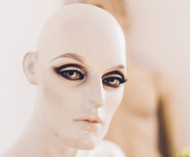Why Some in the Beauty Industry Resist Artificial Intelligence
Posted by MAIR on Jan 4th 2024
In an era where technology is touted as the route for innovation, the beauty industry remains a staple for men and women in need of self-care, enhancements and glamour. While the industry’s resistance to artificial intelligence isn’t causing any riots the embrace towards it is being met by some friction. On the flip side the transformative potential of AI in beauty is widely acknowledged and the potential impact of what it can do has caused excitement among newer brands.
Let's dig into the perspectives that fuel resistance and explore why some beauty professionals and enthusiasts are hesitant to relinquish the reins to the digital revolution.
1. Artistry Meets Automation: At the heart of the beauty industry is a celebration of artistry and uniqueness, a human touch that transforms faces and enhances features. Skeptics argue that AI, despite its capabilities, may struggle to replicate the nuanced creativity, intuition, and emotional intelligence that human artists bring to their craft. The fear is that an overreliance on AI could dilute the personalized and artistic essence of beauty services we’ve grown accustomed to in specialty and department stores.
2. Trust and Personalization Concerns: Building trust with clients is paramount in the beauty world and the personalization of services is a key element of that trust. Some argue that AI, while proficient in processing data, may not fully grasp the emotional and subjective aspects of individual beauty preferences. There's a concern that AI-driven recommendations may lack the personal touch that comes from human understanding and connection.
3. Diversity and Inclusivity Challenges: The beauty industry has made strides in becoming more inclusive, celebrating diverse skin tones, hair types, and beauty standards. Critics of AI integration express reservations about the technology's ability to comprehensively address this diversity. The fear is that AI algorithms might inadvertently perpetuate biases or struggle to cater to the unique needs of every individual, reinforcing existing beauty norms.
4. Ethical Dilemmas: As with any technology, the rise of AI in beauty raises ethical questions. Concerns about data privacy, security, and the responsible use of AI algorithms loom large. Skeptics worry that the rush to adopt AI might overlook these ethical considerations, potentially putting consumer trust and sensitive personal information at risk.
5. Unraveling the Human Experience: I hit on it earlier, but beauty services extend beyond the physical transformation—they are often intertwined with human connection and shared experiences. Some resist AI for fear that an overreliance on technology could erode the personal connections between beauty professionals and their clients, turning beauty treatments into mere transactions rather than intimate and collaborative experiences.
While the beauty industry at large may be moving towards a more technologically integrated future, it's crucial to acknowledge and understand the reservations of those who champion the enduring power of the human touch in beauty. The debate between tradition and innovation continues, highlighting the complex, multifaceted nature of an industry that is as much about emotions and art as it is about technology.
If you're curious to learn how the fragrance industry has embraced using artificial intelligence click here.

